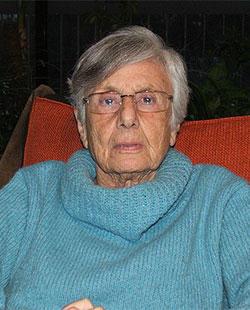Innovative Journalists
One of journalism’s greatest challenges is to make an uninterested public care about news happening on the other side of the earth, in places they’ll never visit, to people they’ll never meet. One 20th century journalist and writer who met that challenge was Ruth Bondy, who was instrumental in the development of the human interest story as a journalistic genre. Bondy used people’s stories, along with her own characteristic humor, to bring sweeping world events to life. Today, media entrepreneurs Carly Zakin and Danielle Weisberg continue in Bondy’s footsteps with their daily email newsletter theSkimm, which makes the news relatable and interesting to a younger generation by presenting it with tongue-in-cheek pop culture references and millennial slang. Separated by half a century, these journalists are notable for their contributions to the media landscape of their times, as well as their ability to present the news in fresh, intriguing ways.
Ruth Bondy was born in the Czech Republic in 1923. As a young journalism student, she planned a trip to Palestine, but found her plans disrupted by Germany's invasion of her country. She was imprisoned in the Terezin ghetto, in Auschwitz, and in Hamburg in the final days of the war, but she survived the Holocaust and at last fulfilled her dream of moving to Israel in 1948.
Bondy started her career as a journalist writing for Omer, a Hebrew newspaper geared towards immigrants. She next wrote for the newspaper Davar, contributing essays, sketches, and commentary throughout the 1950s, including a regular weekend column.
But instead of writing her pieces in the anonymous, straight-reportage style expected from newspapers both then and today, Bondy was a pioneer in writing human interest stories. Her articles humanized anonymous, global events by describing scenes, settings, and most importantly characters. She also became known for her dry humor, which permeated her work and which she brought to her role on the satirical Israeli radio program Three Men in a Boat in the 1950s.
With her particular voice and approach, it’s not surprising that the next step in Bondy’s career was writing biographies. In this genre, she continued to employ her human interest story skills and her eye for contextualizing world events through personal experiences. In her first book, The Emissary, she tells the story of the oldest Palestinian parachutist to drop behind the lines during World War II, thus humanizing the conflict that shaped her young adulthood. Her next, Edelstein Against Time, is a biography of the head of the Council of Elders in the Terezin Ghetto, a book that helped bring the story of this ghetto to Israeli consciousness for the first time.
In the course of her storied career, Bondy has also lent her talents to many fields besides journalism. She has translated more than 50 books into Hebrew, fomenting cultural connections between Israel and Eastern Europe, and is also a historian with a large personal archive. Over the course of the 20th century and into the 21st, this Renaissance woman has applied her wit and distinctive observational powers to a variety of fields, all while revolutionizing the field of journalism.
Carly Zakin and Danielle Weisberg were born a half-century and a world away from Ruth Bondy’s Europe. Children of the 1980s, Zakin and Weisberg came of age in large American cities. But like Bondy, Zakin and Weisberg found a way to make current events interesting to even the most bored reader, through their daily email newsletter theSkimm.
Zakin and Weisberg met during a study abroad semester in Italy. Like Bondy, they also embarked on careers in traditional media, specifically as producers at NBC. During that time, the two young women discovered that they were alone among their friends in their enthusiasm for reading the news. Their overworked millennial peers would often ask them what was going on in the world, saying they lacked the time and interest to pick up a daily paper.
Zakin and Weisberg saw an opportunity to start a snappy e-newsletter that would digest and disseminate information about current events to people like their friends. In 2012, they left NBC to start theSkimm.
TheSkimm takes each day’s main news story and breaks it down into a pithy Q&A, which gives readers all the basic information and context they need to understand what’s going on. The newsletter also summarizes three or four other top news stories in 150-word bites. Like Bondy, Zakin and Weisberg hook their readers through non-news techniques: color, personalization, and, perhaps most importantly, humor. The newsletter is peppered with pop culture references, as well as with wry headlines that draw comparisons between the news and typical scenarios that millennials might find themselves in.
Zakin and Weisberg’s brainchild has caught on quickly: theSkimm’s email digest now goes out to more than four million subscribers five days a week. Besides its tongue-in-cheek approach to the news, part of the newsletter’s appeal lies in its ability to create community. Unlike traditional journalism, theSkimm acknowledges its readers through measures such as saying happy birthday to subscribers; holding drawings for prizes; and encouraging readers to connect with each other through the Skimm’bassador program, in which so-called Skimm’rs network online and in real life. This social media-esque approach to the news is yet another draw for the connection-hungry millennial crowd.
The pair are also involved in other activities besides shaping the future of journalism. Both women volunteer for their respective universities’ alumni networks and for the Young Women’s Leadership Network, an organization that helps at-risk students enroll in college and find career opportunities. But like Bondy, they will perhaps be remembered for reaching new audiences that haven’t traditionally followed “the news” by making world events more vivid, interesting, and relatable.




